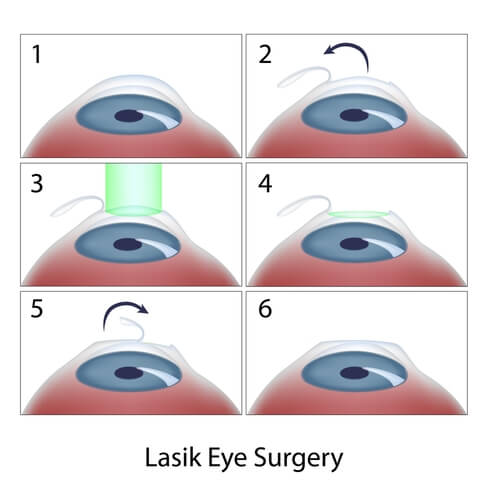What is LASIK, and How Does it Work?
December 4, 2023
LASIK, or Laser-Assisted In Situ Keratomileusis, is a laser vision correction procedure you've likely heard about before. It's talked about by happy patients who have undergone it, or maybe you've considered the procedure if you rely on glasses or contact lenses to see.
But you might have questions about what LASIK is and how does it work? What kind of visual issues can LASIK treat, and how effective is it?
Unless you're an ophthalmologist, it makes sense that you'd have these questions about a procedure before you'd want to undergo it. Keep reading to learn more about LASIK, how it works, and if it might be the right vision correction procedure for you!
What is LASIK?
 LASIK is a refractive laser vision correction procedure that corrects refractive errors. These include nearsightedness, farsightedness, or astigmatism.
LASIK is a refractive laser vision correction procedure that corrects refractive errors. These include nearsightedness, farsightedness, or astigmatism.
LASIK uses a laser to reshape the cornea inside of the eye. By changing the shape of the cornea, the eye can better process light as it enters the retina.
LASIK's appeal comes from the fact that people want better vision than they could achieve with glasses or contact lenses. Getting LASIK improves your quality of life, as it corrects your vision beyond your original prescription.
In most cases, people who get LASIK no longer need visual aids, with most achieving 20/20 vision or better.
What You Need to Know About the Cornea and Retina
The cornea is the surface layer of your eye. This part of the eye is shaped like a dome and has clear tissue.
The cornea, alongside the lens, is essential for reflecting and bending light and sending it back to the retina. The retina is what covers or lines the back part of your eye.
As light hits the retina, it carries signals to your brain. These signals determine what you see. To have clear vision, all of these essential parts of your eye need to collaborate.
If one part of this process is damaged, it will impact your ability to see correctly. When your cornea is misshapen or damaged, light won't enter the retina as it should. As a result, this manifests as people experiencing refractive errors that make their vision blurry or unstable.
Who Can Get LASIK?
LASIK is something many people want, but it's not suitable for everyone. How do you know if you're a good candidate for the vision correction procedure?
The only way to find out if you're a good candidate for LASIK is to schedule a LASIK consultation at Whitten Laser Eye.
Ready for LASIK?
Find out if you’re a candidate.
However, there are some candidacy factors that you can determine on your own. You may be a good candidate for LASIK if:
- You are at least 18 years old
- You have a prescription that's remained stable and unchanged for a year or more
- You have healthy eyes
- You're in good health
- You're not currently pregnant or nursing
- You have thick enough corneas
- You have no other eye conditions other than refractive errors
- If you have dry eyes, they are currently under control and being managed
- You have realistic expectations about what LASIK can achieve
LASIK candidacy factors help protect your eyes while ensuring you receive effective treatment. If you're not a good LASIK candidate, your Whitten Laser Eye ophthalmologist may recommend an alternative procedure.
How Does LASIK Work?
LASIK involves using a femtosecond laser to reshape your cornea. First, you'll receive numbing eye drops to ensure you don't feel any pain.
Then, your LASIK surgeon will create a small flap in your cornea and pull it back. They will reshape your cornea as necessary to correct your refractive errors.
After reshaping the cornea, the flap will be put back into place, where it will heal independently without needing sutures or stitches. Your vision will likely be blurry or unstable following the procedure, so you can't drive yourself home.
You'll need a friend or family member to take you.
Are There Side Effects or Risks of LASIK?
 LASIK is a highly effective vision correction procedure. Around 99% of people who get LASIK end up with vision that's 20/40 or better. Nearly 90% of patients wind up with 20/20 vision.
LASIK is a highly effective vision correction procedure. Around 99% of people who get LASIK end up with vision that's 20/40 or better. Nearly 90% of patients wind up with 20/20 vision.
You may experience side effects like dry eyes, light sensitivity, and some discomfort in the days after LASIK. These are minor and should dissipate over time as your vision continues improving.
Learn More About LASIK
Schedule a Free LASIK Consultation!
Risks of LASIK
Because LASIK is a surgical procedure, risks and complications are possible. Most patients will not experience these, but it is essential to know what could happen, so make sure to discuss these with your LASIK surgeon before your procedure.
Common complications or risks patients can experience include cornea issues requiring further treatment, weakened corneas, inflammation, infection, or worsened vision. If you have any other questions about LASIK, please let us know.
Is LASIK Permanent?
Although LASIK is a permanent procedure, it doesn't mean your vision will never change again. LASIK only reshapes your cornea to correct refractive errors.
However, this doesn't address age-related eye conditions like cataracts and presbyopia, among others. Even if you have LASIK, you can (and likely will) still develop these eye conditions due to age. However, by getting LASIK, you can look forward to visual freedom from glasses and contact lenses for many years, making it a worthy investment in yourself and your vision.
Request a LASIK Consultation Today
LASIK could be the right option for you. If you want to improve your vision, LASIK at Whitten Laser Eye could be the answer.
Are you ready to find out if you'd be a good candidate for LASIK? Schedule your LASIK consultation at Whitten Laser Eye in Maryland in Charlotte Hall and Chevy Chase, and in Virginia in Richmond now! Wouldn't you love to experience what better vision could be like?



